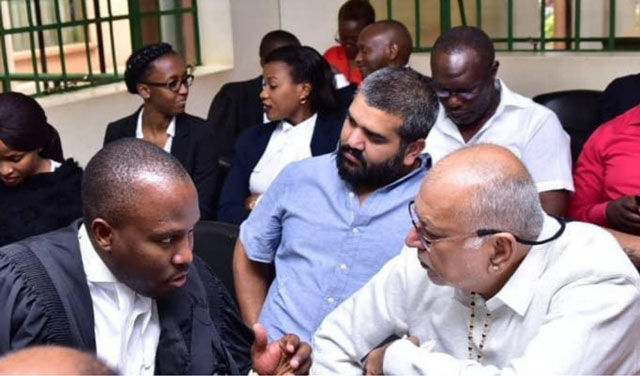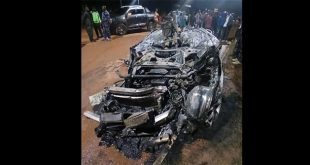
Kampala, Uganda | THE INDEPENDENT | Sudhir Ruparelia and Meera Investments Limited’s lawyers have responded to a statement from Bank of Uganda that gave reasons why they intend to go to the Supreme Court after they lost a recent appeal.
Uganda’s central bank is facing huge costs after losing court cases in the Commercial and Court of Appeal over Sudhir Ruparelia, Meera Investments Limited and Crane Bank Limited (under receivership).
The Bank of Uganda had in 2017 sued Sudhir and his Meera Investments Limited for allegedly siphoning around $92.8million (about Shs334billion) and another Shs8.2billion of depositors’ money from Crane Bank for personal gain.
*****
THE full statement
We act for and on behalf of Dr Sudhir Ruparelia and Meera Investments Limited. Our attention has been drawn to a press release issued by Bank of Uganda on 30th June 2020. The press release was issued on behalf of Crane Bank Limited by the Governor of the Bank of Uganda and published in the print and social media in Uganda. It contained many inaccurate and false statements. Our instructions are to correct the public record.
Why the Case was dismissed by the Court:
1. High Court Civil Suit 493 of 2017 (the suit forming the subject of the appeal) was filed by the Bank of Uganda in the names of Crane Bank Limited in Receivership.
The High Court considered the case and determined that it was not legally tenable as there was no cause of action. The case was accordingly dismissed. There is no court in any part of the world that can proceed to hear a case where no cause of action is disclosed.
2. In both the High Court and the Court of Appeal, the Bank of Uganda addressed the Courts urging them to ignore the fact that it had no cause of action and proceed to hear the case anyway. Bank of Uganda was inviting the courts to ignore the law. Both Courts rejected this legally untenable plea that is now being made in the press.
3. The Court of Appeal in its written judgment stated at page 16 that:
“The Appellant {Bank of Uganda} raises an issue that the court ought to have overlooked the preliminary objections and instead looked at the matter on its merits… we respectfully disagree with the Appellant that if a pleading does not disclose a cause of action or locus standi, the courts should still inquire into the merits of the main case. That would be an action in futility. The courts are not meant to award moot judgments. If a person has no cause of action, then the merits of the case cannot be inquired into lest the court may end up condemning a party who should not have been condemned.”
4. The Bank of Uganda should not be allowed to disrespect the
Courts, when it is the one that went to the courts to seek redress in the first place. If they are unhappy with the decisions of the Court, the legal remedy is to file an appeal and not to criticize the court in the press.
The false claim that tax payers’ money was injected into Crane Bank and Bank of Uganda’s failure to account for it:
5. Bank of Uganda makes a false allegation that tax payers’ money was used to settle Crane Bank Depositors. This statement is used several times in the press statement but it is not part of the case Bank of Uganda filed. It is an allegation designed to sway public opinion, and has nothing to do with the case.
6. Independent inquiries conducted by both the Auditor General and the
Parliament of Uganda (COSASE Committee) have all reported that there was no evidence to support Bank of Uganda’s claims that tax payers’ money was allegedly spent on paying depositors. Money went missing from Bank of
Uganda and remains unaccounted for.
7. Ever since Bank of Uganda took over Crane Bank, it has not published any audited accounts of the Crane Bank. There are no audited accounts for the period of Statutory Management or Receivership. This means that there are no documents of Crane Bank Limited that prove the Bank of Uganda’s allegation that it injected tax payers’ money into Crane Bank.
8. The Head of the legal department at Bank of Uganda in sworn evidence before the High Court stated on oath that Bank of Uganda had not made any loss of money on account of Crane Bank and that it had no legal interest in any case against shareholders. This statement on oath means that Bank of Uganda did not inject into Crane Bank any tax payers’ money.
In direct contradiction of this oath and pleadings filed in court, Bank of Uganda now claims in the press that it is seeking tax payers’ money that it had used to pay depositors.
9. Bank of Uganda’s auditors stated that the money Crane Bank Limited needed to survive was only 130bn shillings. Bank of Uganda alleges (without evidence or any rationale) that it injected 497 billion into Crane Bank and has failed to account for it as shown by both the COSASE and Auditor General’s Reports.
10. There is no forensic Report of any kind that states that US $92 million was extracted from Crane Bank by Dr. Ruparelia as Bank of Uganda alleges in the press statement.
11. Crane bank was subjected to numerous annual, quarterly and special audits and all its financial statements were approved every year by the Bank of Uganda without reservation of any kind. Not one of them alleged any extraction by Dr. Ruparelia. This allegation is absurd.
The unreliability of Bank of Uganda’s so-called forensic investigation:
12. This so-called forensic investigation undertaken by Bank of Uganda is unreliable because the investigators did not interview Dr. Ruparelia, or the Managing Director or the Executive Director as required under forensic audit guidelines. A forensic audit cannot make conclusions without hearing both sides of an issue. This irredeemably taints the so-called forensic investigation and makes the findings unreliable.
A one-sided forensic investigation is not an objective investigation and cannot stand up to legal scrutiny.
13. The official reason given by Bank of Uganda to the public for the takeover of management of Crane Bank Limited was under capitalization due to provisioning for nonperforming loans, not the so-called extraction that is alleged in the press statement, which is an attempt to soil Dr. Ruparelia’s image.
The false allegation that Dr. Ruparelia owned 100% of Crane Bank:
14. The allegation that Dr. Ruparelia owned 100% of Crane Bank is false. All the shareholders of Crane Bank were vetted and approved by the Bank of Uganda in accordance with the Financial Institutions Act.
The allegations made about a settlement agreement:
15. The case Bank of Uganda filed in the High Court and the Appeal in the
Court of Appeal did not include any claims of any kind or any allegations of any kind in relation to a settlement agreement with Dr. Ruparelia. Because Dr. Ruparelia has filed a counter claim, whose subject matter is based on that settlement agreement, the Sub Judice rule precludes him from elaborating more on that matter here.
Constitutional Bar to the claims made against Meera Investments Limited:
16. Meera Investments Limited is a separate legal entity that is not regulated by Bank of Uganda and holds a reversionary interest in real property that the Bank of Uganda would like to take over without any legal basis and in violation of the Constitution of Uganda. This issue was considered by both the High Court and the Court of Appeal and was rejected both times on constitutional grounds. The Bank of Uganda wants the Courts to disregard the Constitution of Uganda to give them what they want.
Bank of Uganda’s complaint in the press that the Courts are limiting its powers to supervise closed banks:
17. It is not the Judgments of the High Court and Court of Appeal that restrict the powers of Bank of Uganda in resolution of closed banks as suggested by the Bank of Uganda in the press statement.
Both judgments stated clearly that the limitation on Bank of Uganda’s powers are found in the Financial Institutions Act.
If the Bank of Uganda is unhappy with those limitations, the appropriate remedy should be to seek to reform the law and amend the statute. It should not be to criticize the Courts in the press as it has done.
Dr Sudhir Ruparelia reserves the right to challenge these malicious and ill founded allegations.
Kampala Associated Advocates
KAA HOUSE, Plot 41 Nakasero Road
 The Independent Uganda: You get the Truth we Pay the Price
The Independent Uganda: You get the Truth we Pay the Price



